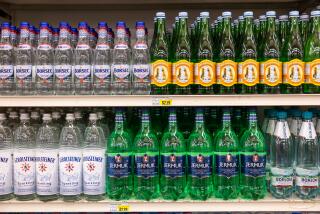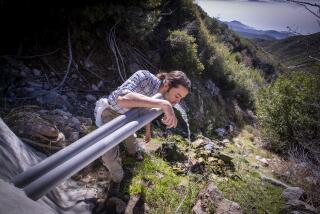Doing Business : Holy Alliance Gets a Venture Flowing : A California entrepreneur and a Russian archbishop team up to tap spring water for sale.
- Share via
MOSCOW — What’s clear, comes in a bottle and is one of the few Russian products that can compete on the world market?
No, it’s not vodka, it’s voda --plain old water.
So say the producers of Saint Springs, an upscale bottled spring water whose source is an unorthodox joint venture between a retired California plastics man and the Russian archbishop of Kostroma and Galich.
Call it a holy alliance, call it a blessed business partnership. John V. R. King, the Lake Arrowhead entrepreneur who hopes to strike it rich selling Russian water, calls it a Russian business miracle.
King, 58, met Archbishop Alexander during a 1992 sightseeing cruise on the Volga River. The young cleric was angling for money to rebuild the crumbling churches of his diocese, seated 200 miles northeast of Moscow in Kostroma. He gave King the time-worn Russian spiel to foreigners--the old story of having unlimited resources and ideas, but just needing a shot of das kapital to bring it all together.
At first King, 10 years into a comfortable retirement, was wary. “Then he mentioned springs,” King recalled. “I didn’t sleep at all that night.”
The dreams that kept King up have now sprung to life, with the help of what he says is a multimillion-dollar sum from 17 U.S. investors, many of them friends from Lake Arrowhead.
Last month, 1.5-liter bottles from the factory--the only plant in Russia to make PET plastic bottles except those of soft drink giants Coca-Cola and Pepsico--hit supermarket shelves and hotel bars in Moscow and St. Petersburg.
King said that while the water meets or exceeds international standards, the bottle is Saint Springs’ prime selling point. Designed by a team headed by one of the investors, Napa Valley winery owner Neil Knott, the bottle has an onion-domed shape, and its costly clear-plastic label sports a drawing of an old wooden church and Archbishop Alexander’s official seal. The bottle is made with the PET (polyethylene terephthelate) recycling process.
Is it unholy for the church to be taking part in such a venture?
Patriarch Alexi II, leader of the Russian Orthodox Church, apparently doesn’t think so: He blessed the springs earlier this year, and in February promoted Alexander, 37, from bishop to archbishop, making him the youngest of 40 Russian clergymen who hold the lofty rank.
While King hopes to strike it rich, Archbishop Alexander said his motives are as pure as the water. It is unclear exactly how potential profits will be divided. King said the church “will realize financial benefits in 1994.” Alexander insisted that “all profits” from the venture will go to rebuild the infrastructure of the Kostroma diocese, repairing the ravages that took place under communism.
The archbishop said the diocese--population 850,000--had about 1,200 houses of worship before the 1917 revolution but emerged from more than seven decades of official atheism with just 70 churches intact.
By blessing the springs--and the factory itself, as he will in the official ribbon-cutting ceremony Friday--Alexi II lends spiritual support to an effort to carve out a niche for a Russian product in Western-dominated markets.
But the Russian Orthodox Church has given Saint Springs more than its blessing.
King said the church has been “the ideal partner,” a skilled navigator on the murky waters of Russian business, where numbing bureaucracy and profit-gouging taxes lurk just beneath a surface solicitation of foreign investment.
“The church is in a position of growing power and influence in Russia, and they have been instrumental in getting this project where it has gotten,” King said. “Russian laws often contradict each other. When we needed to do something at variance with the law, they were able to get an exception made.”
But King said there were fewer problems than he had expected, and the partners managed to get the plant up and running within budget, if not quite within the time frame he had originally set.
King said he originally looked for investment to the Overseas Private Investment Corp. and other U.S. government foundations that support entrepreneurial activity in Russia but decided to go it alone after running into “red tape and delays worse than anything we’ve seen in Russia.”
At first, King worried that the water’s Russian origin would be a sales obstacle. A recent study by the Russian Environment Ministry found that a third of the country’s 148 million citizens get sick every year from drinking water tainted by pollution, dirty pipes and old purification facilities.
But the question has rarely come up with buyers. For Aeroflot, which will be serving Saint Springs water exclusively on international flights from Moscow’s Sheremetyevo airport beginning Aug. 1, the Russian factor is a positive one.
“We looked at a lot of waters, and Saint Springs was the best,” said Daniel Souders, domestic purchasing director for Aeromar, which caters most flights out of Moscow. “No. 1, the quality, and No. 2--it’s Russian.”
King said Delta, the only U.S. airline with direct flights to Moscow and St. Petersburg, had expressed interest, and that New York’s legendary Russian Tea Room had placed an order.
Jari Ahde, the manager of alcohol and waters at a Moscow branch of the Finnish store Stockmann, was less gung-ho about sales. He said Saint Springs is competitively priced at $1.80 for 1.5 liters--55 cents less than Evian and a little more than two Finnish brands--but that it would take some time to erode customers’ loyalty to the Western brands they are used to.
“People have to understand that there can be a good water made here too,” he said.
King is confident that consumers will respond, and he is ready to expand.
He said that by next winter, Saint Springs water will begin flowing into U.S. markets with large Russian-speaking communities, such as Los Angeles, San Francisco and New York.
More to Read
Inside the business of entertainment
The Wide Shot brings you news, analysis and insights on everything from streaming wars to production — and what it all means for the future.
You may occasionally receive promotional content from the Los Angeles Times.










